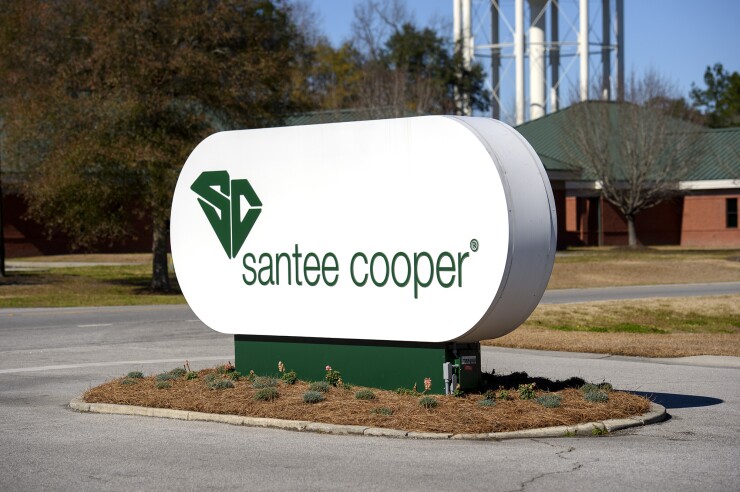South Carolina-owned Santee Cooper has paid off $360 million of long-term debt, a move the utility said is designed to stabilize customers’ electricity rates for at least five years.
The payment is part of a $925 million, two-year plan to reduce the utility’s debt issued to fund its 45% ownership share in the

“Santee Cooper’s customers will benefit by our using debt reduction funds to retire part of our debt now, which produces a better result through long-term savings,” said President and Chief Executive Officer Mark Bonsall. “This transaction enhances the value of Santee Cooper.”
The two-year debt reduction plan is part of a business forecast and strategic generation plan Santee Cooper’s board of directors approved in September. The plan calls for introducing greener generating initiatives, such as solar, and closing four coal-fired generating units over four years.
Santee Cooper, formally known as the South Carolina Public Service Authority, said it closed on paying off bonds issued in 2009 through 2013, 2015 and 2016, as well as certain mini-bonds on Oct. 16.
The deal included $147.67 million of taxable bonds issued in 2016 that were redeemed, according to a notice posted on the Municipal Securities Rulemaking Board’s EMMA filing system Oct. 15.
The South Carolina Department of Administration approved the redemptions, Bonsall said. The SCDOA is overseeing a confidential competitive procurement process to get bids for the potential sale or management of Santee Cooper, which has been ordered by the Legislature.
As part of the process, Santee Cooper will also submit its own reform and restructuring plan to remain a state-owned asset.
The potential sale is supported by Gov. Henry McMaster, some lawmakers, chambers of commerce, and businesses that want to jettison the 85-year-old public power agency to rid the utility of the nuclear project’s debt.
While some lawmakers have said they aren’t convinced a sale would be best for the state, they are expected to determine Santee Cooper’s fate during next year’s legislative session.
In the wake of the nuclear project’s cancellation, a number of lawsuits have also embroiled Santee Cooper in litigation, including a potential class-action federal complaint by an investor in Santee Cooper’s mini-bond program filed in April.
Murray C. Turka filed the lawsuit against Santee Cooper and Lonnie Carter, the authority’s former chief executive officer, alleging violations of federal securities law anti-fraud provisions for failing to disclose pertinent information to investors about the project.
Santee Cooper and Carter have filed a motion to dismiss the case.
Some $151.3 million of mini-bonds were outstanding after the recent redemption, Santee Cooper said Monday.
The turmoil triggered by the July 2017 abandonment of construction on two partially built reactors has resulted in a number of rating downgrades.
In June, S&P Global Ratings lowered its rating on Santee Cooper’s $7 billion of outstanding senior-lien debt to A from A-plus, and maintained a negative outlook, in part because of ongoing judicial and political challenges stemming from its $4.5 billion investment in the failed nuclear project.
S&P also said the downgrade reflected the utility’s strong enterprise risk profile as well as a “vulnerable operational management assessment” that reflected risks from litigation, managerial, and operational fallout from abandoning the partially built reactors.
S&P’s action in June was its second downgrade in two years. Shortly after the project was shelved S&P lowered its rating to A-plus from AA-minus.
In August 2018, Moody's Investors Service lowered its rating to A2 from A1, and Fitch Ratings downgraded the utility’s bonds to A-minus from A-plus in November 2018. Both have negative outlooks.





